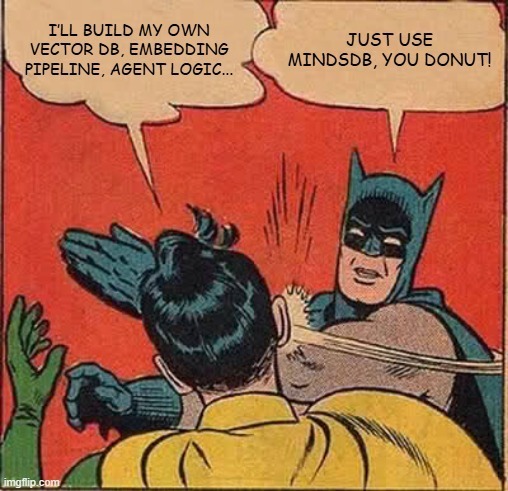MovieMonk: An AI-Powered Movie Recommendation App Using MindsDB Knowledge Base + Agent
🎯 Why I Built MovieMonk
I’m a movie maniac. But scrolling endlessly through streaming platforms or generic recommendation lists? Not fun.
That’s why I built MovieMonk, an AI-powered movie discovery app using MindsDB that lets you ask natural language questions like:
Recommend a thrilling action time travel movie with high ratings from the last 5 years.
🧠 What is MindsDB?
MindsDB is an AI data platform that lets you query data with natural language and build smart agents on top of structured and unstructured sources.
In June 2025, MindsDB introduced Knowledge Bases — a way to semantically index and query documents, similar to vector search — but SQL-native and way more developer-friendly.
🤖 Why MindsDB?
When building an intelligent app, most of the time you get stuck juggling:
- 🔢 Embedding models
- 🧠 Vector databases
- 🔍 Search logic
- 📦 Data pipelines
- 🤯 Prompt engineering
That’s a lot of moving parts for one simple goal: query your data intelligently.
With MindsDB, all of this is unified in one SQL-like interface.
What I Did?
Here’s a quick overview of what I built:
-
Prepared a movie dataset with metadata like Title, Genre, Overview, Release Date, Ratings, etc.
-
Created a MindsDB Project and uploaded the movie data into a table using the Python SDK.
-
Built a Knowledge Base (KB) from that table using Title, Genre, and Overview for semantic search, and added metadata columns like Vote_Average, Popularity, and Release_Date.
-
Created a Movie Agent using CREATE AGENT with a custom prompt so it talks like a friendly movie expert.
-
Evaluated the Knowledge Base using EVALUATE KNOWLEDGE_BASE to check the quality of the results.
🧱 Challenges
Here’s a list of “Problems Faced” based on your context:
- ❌ Encountered error with
version='llm_relevancy'during evaluation, so had to switch toversion='doc_id'. - 🧪 Needed to create a custom test dataset manually for evaluation purposes.
- ⚙️ Faced initial confusion while setting up and managing Jobs.
- 📚 Had no prior experience using a knowledge base, so had to learn its structure and usage (though MindsDB simplified the process).
🎬 Use Cases
MovieMonk is just the beginning — here are other ways you could use MindsDB KBs + Agents:
- Streaming platform assistant: Recommend shows/movies based on user taste
- Smart filtering bot: Let users find media with filters like genre, language, and popularity
- Media search tool: Let analysts or journalists search through a movie database semantically
- Personal movie planner: Build a chatbot that plans your weekend watchlist
- Trivia or quiz bots: Use movie data to power engaging Q&A experiences
🧠 Final Thoughts
Building with MindsDB was a refreshing experience.
It simplified complex tasks like vector search, agent creation, and prompt engineering — all within a single platform. I didn’t have to worry about separate vector databases, embeddings, or model integration.
With just Python, SQL, and a few lines of config, I built a fully functional AI-powered movie app.
MovieMonk proves how easy it is to turn a plain CSV file into a smart, conversational experience.
If you’re thinking about building anything with your own data — whether it’s books, reports, research papers, or customer feedback — MindsDB’s Knowledge Base + Agent combo is a powerful toolkit worth exploring.


